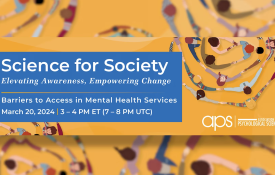-
What we learned from teaching a course on the science of happiness
When you deliver a university course that makes students happier, everybody wants to know what the secret is. What are your tips? What are your top ten recommendations? These are the most asked questions, as if there is some quick, surefire path to happiness. The problem is that there are no life-transforming discoveries, because most of what works has already been talked about. Social connection, mindfulness, gratitude letters, acts of kindness, going for a walk in nature, sleep hygiene, limiting social media use. These are some of the 80 or so psychological interventions which have been shown to work to improve our wellbeing (to a lesser or greater extent). ...
-
Men psychology researchers can’t seem to remember their women colleagues
When asked who is an expert in their field, men psychology researchers name significantly fewer women than their women colleagues do, a new study found. The results, reflecting men’s implicit bias, help explain why women are less likely than men to receive citations to their work or to be invited to speak at meetings and apply for jobs—even as more than 70% of Ph.D.s in the field were awarded to women in recent years. ...
-
A new religion has Americans looking to the stars
Belief in aliens is no longer fringe. Fifty-one percent of Americans think that unidentified flying objects are likely controlled by extraterrestrials — an increase of more than 20 percentage points since 1996. And one in three believe we’re likely to make formal contact with aliens in the next 50 years. But as someone who studies the psychology of religion, what’s most striking to me isn’t the widespread belief that aliens are out there — in the vastness of the universe, it’s unlikely that we’re alone — but rather the growing popularity of blending this belief with spirituality.
-

Driving Simulation and AI Deepen Insights into Impulsivity
Lab experiments sometimes have participants engage in tasks that don’t capture the full range of behaviors people display in their day-to-day lives, but pairing realistic tasks with machine learning could help researchers more accurately assess individuals’ personality traits.
-
Daniel Kahneman, Nobel-winning economist, dies at 90
Daniel Kahneman, an Israeli-American psychologist and best-selling author whose Nobel Prize-winning research upended economics — as well as fields ranging from sports to public health — by demonstrating the extent to which people abandon logic and leap to conclusions, died March 27. He was 90. His death was confirmed by his stepdaughter Deborah Treisman, the fiction editor for the New Yorker. She did not say where or how he died. Dr. Kahneman’s research was best known for debunking the notion of “homo economicus,” the “economic man” who since the epoch of Adam Smith was considered a rational being who acts out of self-interest. Instead, Dr.
-

Science Breaks Through the Barricades to Mental Healthcare
Researchers and clinicians are attempting to break down the institutional and social factors that block marginalized populations from receiving mental health services.

